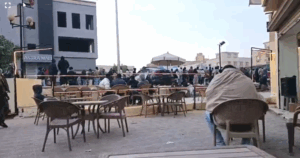‘Historic agreement’ signed by Sudan govt, armed groups in Juba
The Sudanese government and the Sudan Revolutionary Front rebel alliance initialled a comprehensive peace agreement in the South Sudan capital of Juba yesterday. The agreement includes eight protocols for the five tracks (Darfur, the Two Areas, central Sudan, eastern Sudan, and northern Sudan) that have been the subject of a year’s intensive negotiations.
 Lt Gen Mohamed Hamadan ‘Hemeti’, Deputy President of the Sovereign Council, and Commander-in-Chief of the paramilitary Rapid Support Forces (left) applauds as Chairman of Sudan’s Sovereign Council Lt Gen Abdelfattah El Burhan, South Sudan President Salva Kiir, and Sudan’s Prime Minister Abdallah Hamdok, display copies of the agreement (RD correspondent)
Lt Gen Mohamed Hamadan ‘Hemeti’, Deputy President of the Sovereign Council, and Commander-in-Chief of the paramilitary Rapid Support Forces (left) applauds as Chairman of Sudan’s Sovereign Council Lt Gen Abdelfattah El Burhan, South Sudan President Salva Kiir, and Sudan’s Prime Minister Abdallah Hamdok, display copies of the agreement (RD correspondent)
The Sudanese government and the Sudan Revolutionary Front rebel alliance initialled a comprehensive peace agreement in the South Sudan capital of Juba yesterday. The agreement includes eight protocols for the five tracks (Darfur, the Two Areas, central Sudan, eastern Sudan, and northern Sudan) that have been the subject of a year’s intensive negotiations.
The accord heralds the start of a transitional period of three years, effective from the date of the signing of the peace agreement. Three new seats on the Sovereign Council will be filled by representatives of the peace signatories, who will also be allocated five ministerial portfolios according to the procedure stipulated in the Constitutional Document (signed in August 2019), equivalent to 25 per cent of the Council of Ministers.
The two parties agreed that the signatories of the peace agreement will be represented in the Transitional Legislative Council by 25 per cent which equates to 75 of the 300 seats.
Federal regional system of government
A federal regional system of government will be re-established in Sudan. The transitional government will take the required legal measures within a period of 60 days from the date of signing the peace agreement.
Within this period, a national conference will be held to review the administrative division of regions, the various levels of government, structures, powers and competencies of governance.

Darfur
Khartoum and the Darfur rebel movements agreed to form a force to maintain security in the conflict-torn western region. The initial strength will be 12,000, which can be increased.
According to the security arrangements protocol, the Darfur force will consist of 6,000 members of the Sudan Armed Forces (SAF), the paramilitary Rapid Support Forces (RSF), police and security officers, and 6,000 former rebel combatants.
The tasks of the force is to coordinate between the leadership of the security forces in Darfur, the security committees of the Darfur states, and the cease-fire committee.
The two parties agreed that the rebel combatants to be incorporated will remain in Darfur for a period of 40 months from the date of signing the agreement, during which the then ex-rebels will join military units according to the structure of the armed forces.
The security arrangements protocol stipulates a long and short-term reform in the military and other security agencies, which supports “the establishment of a permanent and independent professional system”.
The parties to the peace agreement will share power in Darfur according to quotas for each party.

Power-sharing
Darfur will be considered one region. The members of the Darfur track will participate in the regional government to be established. The presidency of the government will be allocated to a leading member of the Darfur track.
The members of the Darfur track are entitled to 40 per cent of power in Darfur, another 10 per cent is allocated to the other movements that signed the agreement. The federal government gets 30 per cent, and the stakeholders 20 per cent of the leading positions in Darfur.
The power-sharing agreement for Darfur stipulates that the parties should select representatives among all the communities in Darfur, to reflect the geographical, social and cultural diversity of the region, to ensure social coexistence and peace.

and Commander-in-Chief of the paramilitary Rapid Support Forces
Southern Sudan
With respect to South Kordofan and Blue Nile state, Khartoum and the Sudan People’s Liberation Movement-North faction headed by Malik Agar agreed on the autonomy of the Two Areas, to which West Kordofan has been added.
The two parties agreed in April this year that the Two Areas track will include West Kordofan as well. The state which was part of South Kordofan since 2005 and re-established in 2013 will remain a separate state.
The SPLM-N Agar will hold the position of governor in Blue Nile state and of deputy governor in South and West Kordofan, with a right to 30 per cent of the executive and legislative bodies in Blue Nile state, and South and West Kordofan.
Holdout rebels
The peace agreement signed yesterday in the South Sudanese capital of Juba did not include the Sudan People’s Liberation Movement-North faction under the leadership of Abdelaziz El Hilu (SPLM-N El Hilu) in South Kordofan and parts of Blue Nile state, and the mainstream Sudan Liberation Movement in Darfur, led by Abdelwahid El Nur (SLM-AW).
In speeches after the signing of the peace accord, Chairman of the Sovereign Council Lt Gen Abdelfattah El Burhan, Prime Minister Abdallah Hamdok, and South Sudan President Salva Kiir, all called on El Hilu and El Nur to join the peace negotiations.
International community
The international community has reacted positively, with the USA, the United Kingdom, and Norway (the Troika), as well as the European Union and the African Union-United Nations Mission in Darfur (UNAMID), all issuing statements welcoming the accord (see further Radio Dabanga reports today). They all echoed the appeal for the remaining armed movements to join the negotiations.
Radio Dabanga’s editorial independence means that we can continue to provide factual updates about political developments to Sudanese and international actors, educate people about how to avoid outbreaks of infectious diseases, and provide a window to the world for those in all corners of Sudan. Support Radio Dabanga for as little as €2.50, the equivalent of a cup of coffee.












 and then
and then